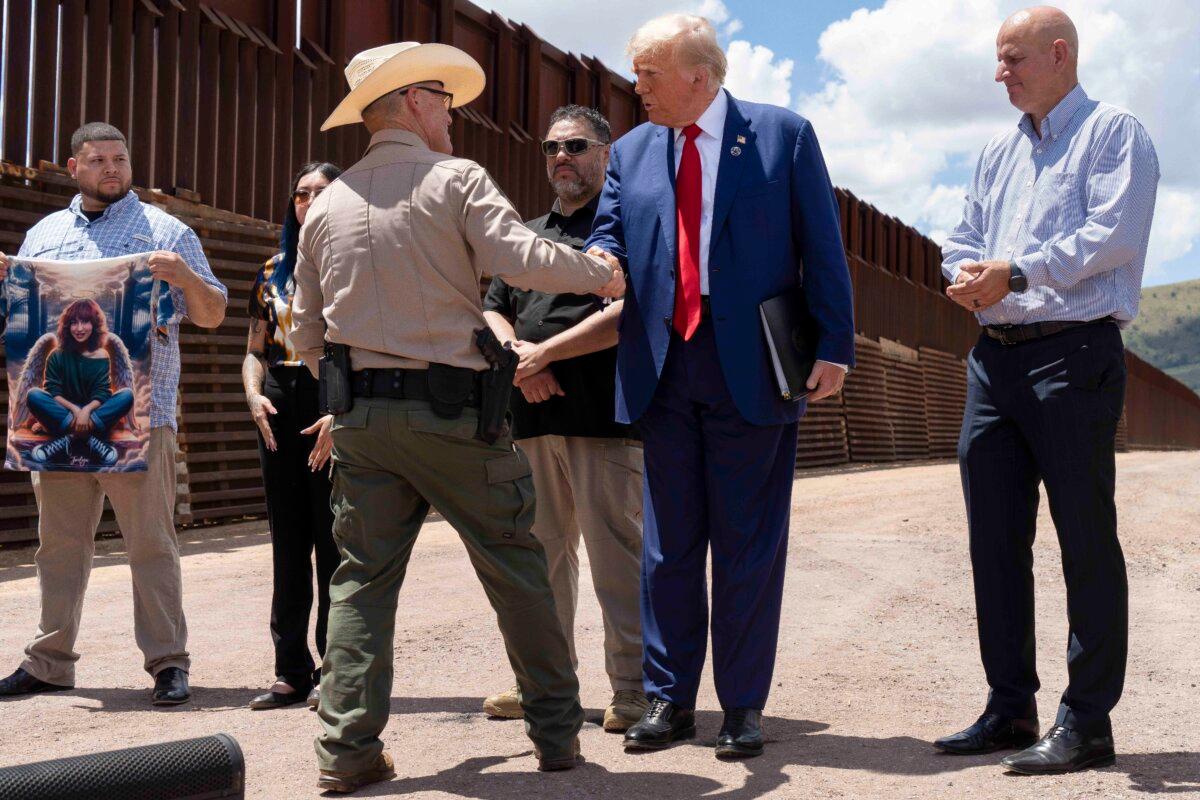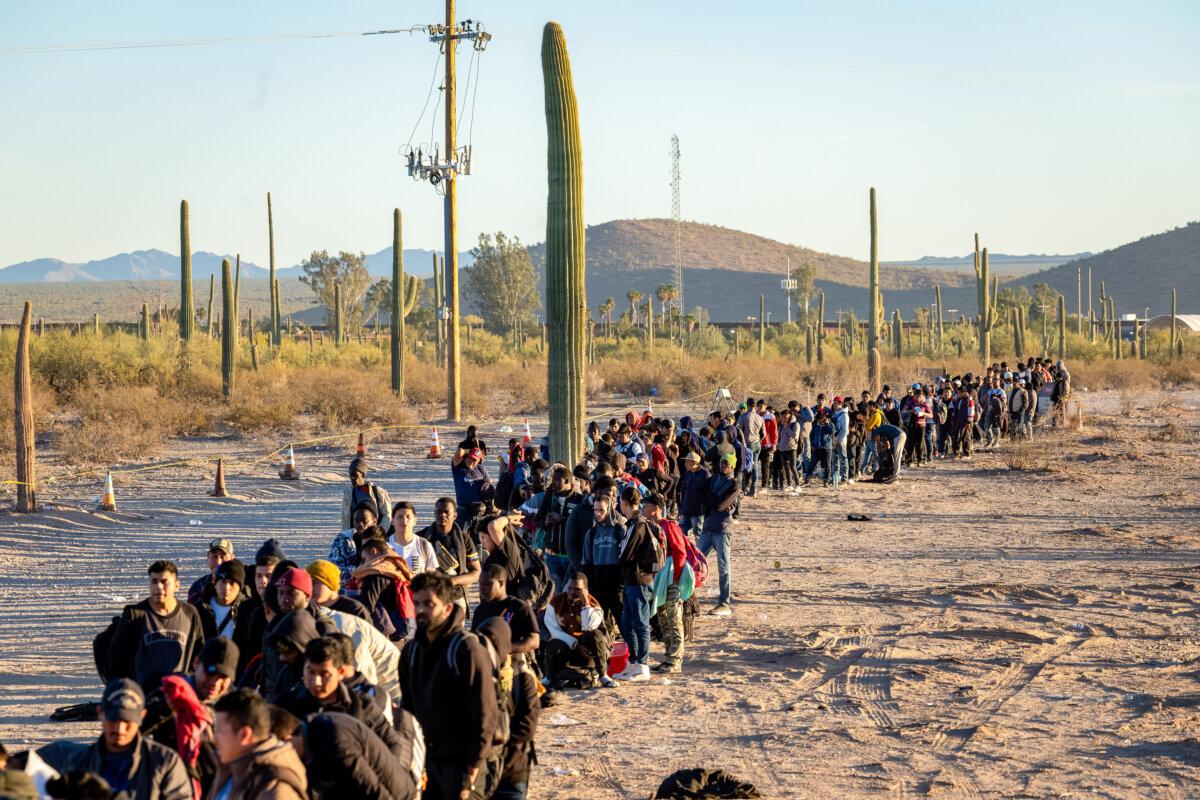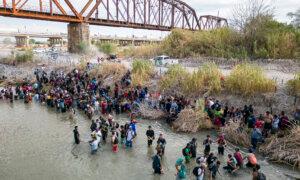Arizona’s Proposition 314 giving state law enforcement the power to arrest illegal immigrants leaves unanswered questions, while Texas remains committed.
Arizona became one of the latest states to pass a measure giving local authorities the power to arrest and deport illegal immigrants.
With Trump’s promise to address the border crisis, questions remain as to what’s next for laws that allow states to arrest and deport illegal immigrants.
Arizona’s Proposition 314, which was on the Nov. 5 ballot, easily passed, with 62.6 percent of Arizona voters in favor of the measure and 37.4 against.
The proposition was placed on the ballot after Democratic Gov. Katie Hobbs vetoed a border security bill passed by Arizona’s Republican-led legislature.
The proposition’s passage, however, leaves a lot of unanswered questions.
During an interview on X after the election, Arizona’s Cochise County Sheriff Mark Dannels said Arizona sheriffs need guidance if the proposition takes effect.
“Where do we go from here?“ he asked. “And where’s the infrastructure support for this?”
Proposition 314 prohibits illegal immigrants from entering the state directly from a foreign country except for lawful ports of entry, with violators facing misdemeanor charges on the first offense and felony charges for repeat offenders.
Local and state police would have the power to arrest those entering illegally, and state judges could deport them.
Applicants for financial aid or public assistance must be screened through the federal E-Verify system to check immigration status, along with job applicants, who were already required by state law to be screened. Submitting false information could result in misdemeanor or felony charges.

Cochise County Sheriff Mark Dannels shakes hands with former President Donald Trump at the U.S.-Mexico border fence south of Sierra Vista, Arizona, on Aug. 22, 2024. Rebecca Noble/Getty Images
The proposition also cracks down on the sale of fentanyl, making it a Class 2 felony if a person knowingly sells the deadly drug and causes the death of another person.
However, there’s a catch for the immigration portion of the law.
It will only go into effect once a similar state law, such as Texas Senate Bill 4, goes into effect in a different state for 60 consecutive days.
The American Civil Liberties Union (ACLU) of Arizona called Proposition 314 “a sweeping and divisive law that will incite the discrimination and harassment of immigrants“ in a statement after voters passed it.
“The ACLU of Arizona will consider all options to prevent the implementation of this unconstitutional and harmful law,“ the group stated.
Stan Barnes, president of Copper State Consulting Group in Arizona, a political consulting firm, told The Epoch Times that Trump’s election would likely mean the proposition becomes a moot point.
“I have a feeling it’s going to be a whole lot of nothing,“ he said.
The proposition will likely be more symbolic than functional, given Trump’s vow of mass deportation of illegal immigrants, he said.
Arizona’s Senate President Warren Petersen indicated as much last week, Barnes added.
In addition to Texas, Iowa and Oklahoma passed similar bills, Senate File 2340 and House Bill 4156, respectively, which remain temporarily blocked by federal courts pending decisions on their constitutionality.
The question now is what role will states like Texas play under President-elect Trump, said Selene Rodriguez, the campaign director of the Secure & Sovereign Texas campaign with the Texas Public Policy Foundation.

Illegal immigrants line up at a remote U.S. Border Patrol processing center after crossing the U.S.–Mexico border, in Lukeville, Ariz., on Dec. 7, 2023. John Moore/Getty Images
And while Trump has praised and supported Texas’ fight against illegal immigration, all that could change again in four years with a new administration.
“I honestly don’t think we’re going to see Texas necessarily step down,“ Rodriguez told The Epoch Times.
“We’ve learned the hard lesson that we will have to stand alone, and it’ll be up to us, and only us,“ she said.
Texas’s SB 4 became law in March, but it remains in limbo after the U.S. Department of Justice and civil rights groups sued.
Illegal immigrants who enter Texas outside legal ports of entry can be arrested on Class B misdemeanor charges and sentenced to up to six months in jail under the law.
However, repeat offenders could face second-degree felony charges and sentences of up to 20 years in prison.
The Texas law will likely end up in the U.S. Supreme Court, against the backdrop of a 2012 Arizona law struck down by the high court, which ruled immigration was a function of the federal government.
Texas took the stance that it has sovereignty over its borders and should be allowed to protect its residents from an “invasion“ if the federal government doesn’t.
More than 10 million illegal immigrants have come into the United States over the past four years under the Biden-Harris administration, with most crossing the U.S. southern border with Mexico.

Border Patrol agents apprehend illegal immigrants shortly after they crossed the border from Mexico into the United States in the Rio Grande Valley Sector near McAllen, Texas, on March 26, 2018. Loren Elliott/AFP/Getty Images
There are indications the high court, whose makeup has grown more conservative over the past few years, could reverse itself on the issue.
The U.S. Supreme Court allowed the Texas law to go into effect earlier this year after sending it back to the U.S. Court of Appeals for the Fifth Circuit. The appeals court then halted enforcement while it considered the latest appeal.
Rodriguez said Texas lawmakers are already eying new border legislation for the 2025 session beginning this January.
At the Texas GOP convention in June, Republicans prioritized the creation of a Texas Department of Homeland Security to prevent illegal entry and conduct deportations.
State Republicans passed another resolution calling for the legislation to require proof of citizenship for new voter registrations and a review of existing voter rolls to identify and remove noncitizens.
Rodriguez said many believe securing the border goes beyond stopping illegal immigration. A secure border is essential for national security and to combat the drug cartels who deal in human trafficking and fentanyl.
Several laws have already been filed for the upcoming Texas session to address security at the border.
Texas House Bill 354, filed by Republican Briscoe Cain, would form a “border protection unit“ with the authority to arrest people crossing the Mexico-Texas border illegally, mirroring the function of U.S. Customs and Border Protection agents.

An illegal immigrant from Guatemala reaches a dead end on trying to enter Shelby Park in Eagle Pass, Texas, on Jan. 23, 2024. Darlene McCormick Sanchez/The Epoch Times
State Republican Sen. Bob Hall filed Senate Bill 81, giving the Department of Public Safety the authority to return people to Mexico who enter Texas illegally “during a state of invasion or imminent danger on the Texas-Mexico border.“
Abbott earlier this year invoked the invasion clause of the U.S. and Texas constitutions to justify the state’s ongoing border operations.
Rodriguez agreed that Texas has the constitutional right to protect its citizens.
“The Federal Government broke [its] compact with not just Texas, but every state across the nation when they refused to do their constitutional duty,“ she said.
She said Texas was in danger of no longer being a sovereign state after large numbers of illegal immigrants crossed the Texas-Mexico border over the past four years.
“If Texas is gone, the nation is gone,“ she said.
Original News Source Link – Epoch Times
Running For Office? Conservative Campaign Consulting – Election Day Strategies!


